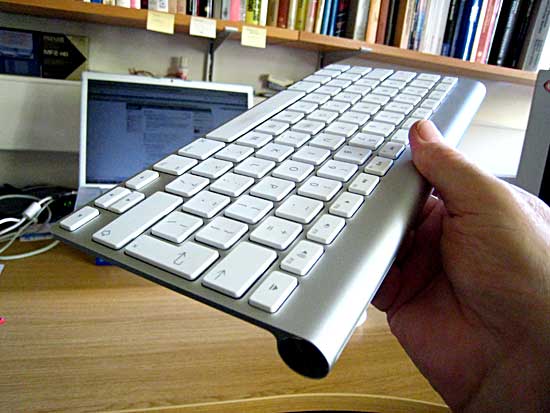The WSJ is reporting a change of tack by Nick Negroponte and his One Laptop Per Child project. (IHT report here.)
The high-profile “One Laptop Per Child” effort to bridge the digital divide between the developed and developing worlds is setting its sights closer to home.
After months of debate, the program is set to announce today that it will sell its affordable “XO” laptops, custom-built for the developing world, in North America. But there is a twist: Buyers here must purchase two computers — one for themselves and one for a child in the developing world, for a combined cost of $399, some of which is tax-deductible.
The nonprofit program also is talking to more than a dozen governors and numerous school districts about bulk orders, according to Walter Bender, president for software and content for the One Laptop per Child Foundation, of Cambridge, Mass. Offering the computers in the U.S., he says, will help finance overseas deployments and raise awareness about the project among U.S. students and teachers…
This is great news for several reasons. It shows courage and flexibility on the part of Nicholas Negroponte and his team. It’s been clear for some time that their original strategy — of getting governments in developing countries to sign up for bulk orders of a million+ was never going to work when it came to the crunch. Most of these governments couldn’t run a bath, never mind execute a coherent, bold ICT strategy. So there was an urgent need for a Plan B.
Now we know what it is. My hunch is that the ‘buy two, donate one’ might just take off in a big way. First of all, it enables many people in the developed world to get their hands on what is a very neat device. Secondly, it ties neatly into the philanthropic instincts of many technophiles. I’d happily buy some machines on the basis proposed — not least because I’m convinced that there are useful things Ndiyo can do with the laptops. The only snag is that the purchase offer is only open to US and Canadian residents. (Thinks… time to lean on some of my American friends.)
Aside: I love people who are big enough to change their minds in public. I’ve never shared the British media’s hysterical contempt for “U-Turns”. Often a U-turn is the only rational thing to do. Consistency — as Oscar Wilde said — is a puerile obsession. And, as Keynes famously retorted to a journalist who accused him of an about-face: “When the facts change, I change my mind. What do you do?”

 Like many people who write for a living, I’m obsessed with keyboards. I loved the early IBM PC keyboards, which had proper microswitches and made an agreeable clacking sound. But then mass production took hold and the tactile attractiveness of keyboards declined, to the point where most of them had a repulsive mushy feel. Unusually for a company that is supposed to care about design and ergonomics of
Like many people who write for a living, I’m obsessed with keyboards. I loved the early IBM PC keyboards, which had proper microswitches and made an agreeable clacking sound. But then mass production took hold and the tactile attractiveness of keyboards declined, to the point where most of them had a repulsive mushy feel. Unusually for a company that is supposed to care about design and ergonomics of